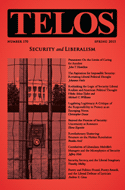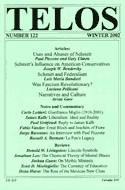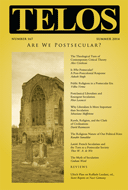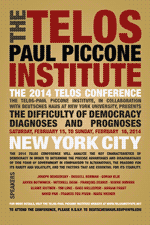By Timothy Melley · Tuesday, March 31, 2015
 Western societies increasingly imagine, plan, and even rehearse their own destruction. This cultural habit reflects a growing contradiction in democracy. On the one hand, liberal societies laud the ideals of participatory democracy, free speech, individual liberty, and governmental transparency. On the other, they grow ever more committed to the biopolitical regulation of life, the mitigation of threats to public health and safety, and the restriction of liberties as a way of securing liberty itself. How do we understand the inexorable growth of a security paradigm in liberal democracies? The answer lies partly in the cultural imaginary that shapes public contemplation of citizenship, liberty, and security. This imaginary reflects both the growing influence of biopolitics and the legacy the Cold War covert action. Paradoxically, the Cold War state’s growing commitment to covert action was itself increasingly public; as a result, public culture has became obsessed with, and enamored of, covert affairs. Despite state secrecy, most citizens believe they know the “kinds of things” their government is doing in secret—yet they cannot know in detail, and they receive most of their knowledge in the form of melodramatic fiction. The result is a growing irrationality in the democratic public sphere. Western societies increasingly imagine, plan, and even rehearse their own destruction. This cultural habit reflects a growing contradiction in democracy. On the one hand, liberal societies laud the ideals of participatory democracy, free speech, individual liberty, and governmental transparency. On the other, they grow ever more committed to the biopolitical regulation of life, the mitigation of threats to public health and safety, and the restriction of liberties as a way of securing liberty itself. How do we understand the inexorable growth of a security paradigm in liberal democracies? The answer lies partly in the cultural imaginary that shapes public contemplation of citizenship, liberty, and security. This imaginary reflects both the growing influence of biopolitics and the legacy the Cold War covert action. Paradoxically, the Cold War state’s growing commitment to covert action was itself increasingly public; as a result, public culture has became obsessed with, and enamored of, covert affairs. Despite state secrecy, most citizens believe they know the “kinds of things” their government is doing in secret—yet they cannot know in detail, and they receive most of their knowledge in the form of melodramatic fiction. The result is a growing irrationality in the democratic public sphere.
Continue reading →
 When Edward Snowden, on June 9, 2013, revealed his identity in a video interview posted on the website of the Guardian, he invoked the intellectual framework of liberalism in order to explain why he had leaked a massive trove of secret documents about the spying and data collection practices of the National Security Administration (NSA) and its partner agencies. Having regularly witnessed the legal abuses of the NSA as a technical assistant for the CIA and, subsequently, as an employee of the defense contractor Booz Allen Hamilton, Snowden explained that “over time [the] awareness of wrongdoing builds up and you feel compelled to talk about it . . . until eventually you realize that these things need to be determined by the public, not by somebody who’s simply hired by the government.” When Edward Snowden, on June 9, 2013, revealed his identity in a video interview posted on the website of the Guardian, he invoked the intellectual framework of liberalism in order to explain why he had leaked a massive trove of secret documents about the spying and data collection practices of the National Security Administration (NSA) and its partner agencies. Having regularly witnessed the legal abuses of the NSA as a technical assistant for the CIA and, subsequently, as an employee of the defense contractor Booz Allen Hamilton, Snowden explained that “over time [the] awareness of wrongdoing builds up and you feel compelled to talk about it . . . until eventually you realize that these things need to be determined by the public, not by somebody who’s simply hired by the government.”
Continue reading →
By Telos Press · Sunday, December 7, 2014 Writing in the Washington Post, George Will discusses Joel Kotkin’s The New Class Conflict (recently published by Telos Press) and the reasons why today’s government serves the wealthy and powerful.
Continue reading →
By Michael Millerman · Tuesday, August 12, 2014  Like Spinoza, many liberal thinkers have defined the liberty they promote in terms of the necessity of submitting to the law that guarantees it. This is a unique kind of rule of law, a rule of the “‘politically correct,’ universalist, managerial-liberal” (9) law of contemporary liberals. Both internationally and domestically, this law requires the muscular imposition of questionable political, moral, and economic principles, by means of an insidious and often nauseating bureaucratic, technocratic, mediacratic apparatus, onto largely unwilling publics. Crucially, the freedom championed by such liberals and allegedly secured by their law does not include the freedom to refuse their domination root and branch. Like Spinoza, many liberal thinkers have defined the liberty they promote in terms of the necessity of submitting to the law that guarantees it. This is a unique kind of rule of law, a rule of the “‘politically correct,’ universalist, managerial-liberal” (9) law of contemporary liberals. Both internationally and domestically, this law requires the muscular imposition of questionable political, moral, and economic principles, by means of an insidious and often nauseating bureaucratic, technocratic, mediacratic apparatus, onto largely unwilling publics. Crucially, the freedom championed by such liberals and allegedly secured by their law does not include the freedom to refuse their domination root and branch.
Continue reading →
By Russell A. Berman · Monday, June 16, 2014  Critical theory inherited classical accounts of social change that linked modernization processes to secularization: in order for societies to overcome traditionalist structures and pursue the accelerated development of modernity, they would have to escape the grip of religion. This is perhaps most famously the case for Marx, who, in the introduction to his Critique of Hegel’s Philosophy of Right, declared religion “the opium of the people,” blocking the way of progress: “The abolition of religion as the illusory happiness of the people is the demand for their real happiness. To call on them to give up their illusions about their condition is to call on them to give up a condition that requires illusions. The criticism of religion is, therefore, in embryo, the criticism of that vale of tears of which religion is the halo.” To surmount a social condition that produces unhappiness requires renouncing the systematic concealing of that condition which is, so Marx, the genuine function of religion, the ultimate paradigm of ideology as false consciousness. Critical theory inherited classical accounts of social change that linked modernization processes to secularization: in order for societies to overcome traditionalist structures and pursue the accelerated development of modernity, they would have to escape the grip of religion. This is perhaps most famously the case for Marx, who, in the introduction to his Critique of Hegel’s Philosophy of Right, declared religion “the opium of the people,” blocking the way of progress: “The abolition of religion as the illusory happiness of the people is the demand for their real happiness. To call on them to give up their illusions about their condition is to call on them to give up a condition that requires illusions. The criticism of religion is, therefore, in embryo, the criticism of that vale of tears of which religion is the halo.” To surmount a social condition that produces unhappiness requires renouncing the systematic concealing of that condition which is, so Marx, the genuine function of religion, the ultimate paradigm of ideology as false consciousness.
Continue reading →
By James King · Friday, April 18, 2014 The following paper was presented at the Eighth Annual Telos Conference, held on February 15–16, 2014, in New York City.
 In the perspective of many, the prime criticism of liberal theories of democratic politics is that such theories proceed with a certain false and idealized individual in mind—these are great theories, elegant or hubristic, but at bottom, theories and not “real politics.” Political liberalism wrongly imagines the citizen to be a rational individual, sure of his will and life plans—or is this imagining wrong? The deeper critique holds that liberalism describes a peculiar individual, and that this individual really exists, but looks strangely like the liberal theorist and his class. Thus, for example, John Rawls’s theory of justice is suggested to fail women and the profoundly disabled. My critique today follows in this vein; I wish to add to this characterization of liberalism’s presumed political actor by showing him to be antiheroic. In the perspective of many, the prime criticism of liberal theories of democratic politics is that such theories proceed with a certain false and idealized individual in mind—these are great theories, elegant or hubristic, but at bottom, theories and not “real politics.” Political liberalism wrongly imagines the citizen to be a rational individual, sure of his will and life plans—or is this imagining wrong? The deeper critique holds that liberalism describes a peculiar individual, and that this individual really exists, but looks strangely like the liberal theorist and his class. Thus, for example, John Rawls’s theory of justice is suggested to fail women and the profoundly disabled. My critique today follows in this vein; I wish to add to this characterization of liberalism’s presumed political actor by showing him to be antiheroic.
Continue reading →
|
|
 Western societies increasingly imagine, plan, and even rehearse their own destruction. This cultural habit reflects a growing contradiction in democracy. On the one hand, liberal societies laud the ideals of participatory democracy, free speech, individual liberty, and governmental transparency. On the other, they grow ever more committed to the biopolitical regulation of life, the mitigation of threats to public health and safety, and the restriction of liberties as a way of securing liberty itself. How do we understand the inexorable growth of a security paradigm in liberal democracies? The answer lies partly in the cultural imaginary that shapes public contemplation of citizenship, liberty, and security. This imaginary reflects both the growing influence of biopolitics and the legacy the Cold War covert action. Paradoxically, the Cold War state’s growing commitment to covert action was itself increasingly public; as a result, public culture has became obsessed with, and enamored of, covert affairs. Despite state secrecy, most citizens believe they know the “kinds of things” their government is doing in secret—yet they cannot know in detail, and they receive most of their knowledge in the form of melodramatic fiction. The result is a growing irrationality in the democratic public sphere.
Western societies increasingly imagine, plan, and even rehearse their own destruction. This cultural habit reflects a growing contradiction in democracy. On the one hand, liberal societies laud the ideals of participatory democracy, free speech, individual liberty, and governmental transparency. On the other, they grow ever more committed to the biopolitical regulation of life, the mitigation of threats to public health and safety, and the restriction of liberties as a way of securing liberty itself. How do we understand the inexorable growth of a security paradigm in liberal democracies? The answer lies partly in the cultural imaginary that shapes public contemplation of citizenship, liberty, and security. This imaginary reflects both the growing influence of biopolitics and the legacy the Cold War covert action. Paradoxically, the Cold War state’s growing commitment to covert action was itself increasingly public; as a result, public culture has became obsessed with, and enamored of, covert affairs. Despite state secrecy, most citizens believe they know the “kinds of things” their government is doing in secret—yet they cannot know in detail, and they receive most of their knowledge in the form of melodramatic fiction. The result is a growing irrationality in the democratic public sphere.  Like Spinoza, many liberal thinkers have defined the liberty they promote in terms of the necessity of submitting to the law that guarantees it. This is a unique kind of rule of law, a rule of the “‘politically correct,’ universalist, managerial-liberal” (9) law of contemporary liberals. Both internationally and domestically, this law requires the muscular imposition of questionable political, moral, and economic principles, by means of an insidious and often nauseating bureaucratic, technocratic, mediacratic apparatus, onto largely unwilling publics. Crucially, the freedom championed by such liberals and allegedly secured by their law does not include the freedom to refuse their domination root and branch.
Like Spinoza, many liberal thinkers have defined the liberty they promote in terms of the necessity of submitting to the law that guarantees it. This is a unique kind of rule of law, a rule of the “‘politically correct,’ universalist, managerial-liberal” (9) law of contemporary liberals. Both internationally and domestically, this law requires the muscular imposition of questionable political, moral, and economic principles, by means of an insidious and often nauseating bureaucratic, technocratic, mediacratic apparatus, onto largely unwilling publics. Crucially, the freedom championed by such liberals and allegedly secured by their law does not include the freedom to refuse their domination root and branch.  Critical theory inherited classical accounts of social change that linked modernization processes to secularization: in order for societies to overcome traditionalist structures and pursue the accelerated development of modernity, they would have to escape the grip of religion. This is perhaps most famously the case for Marx, who, in the introduction to his Critique of Hegel’s Philosophy of Right, declared religion “the opium of the people,” blocking the way of progress: “The abolition of religion as the illusory happiness of the people is the demand for their real happiness. To call on them to give up their illusions about their condition is to call on them to give up a condition that requires illusions. The criticism of religion is, therefore, in embryo, the criticism of that vale of tears of which religion is the halo.” To surmount a social condition that produces unhappiness requires renouncing the systematic concealing of that condition which is, so Marx, the genuine function of religion, the ultimate paradigm of ideology as false consciousness.
Critical theory inherited classical accounts of social change that linked modernization processes to secularization: in order for societies to overcome traditionalist structures and pursue the accelerated development of modernity, they would have to escape the grip of religion. This is perhaps most famously the case for Marx, who, in the introduction to his Critique of Hegel’s Philosophy of Right, declared religion “the opium of the people,” blocking the way of progress: “The abolition of religion as the illusory happiness of the people is the demand for their real happiness. To call on them to give up their illusions about their condition is to call on them to give up a condition that requires illusions. The criticism of religion is, therefore, in embryo, the criticism of that vale of tears of which religion is the halo.” To surmount a social condition that produces unhappiness requires renouncing the systematic concealing of that condition which is, so Marx, the genuine function of religion, the ultimate paradigm of ideology as false consciousness.  In the perspective of many, the prime criticism of liberal theories of democratic politics is that such theories proceed with a certain false and idealized individual in mind—these are great theories, elegant or hubristic, but at bottom, theories and not “real politics.” Political liberalism wrongly imagines the citizen to be a rational individual, sure of his will and life plans—or is this imagining wrong? The deeper critique holds that liberalism describes a peculiar individual, and that this individual really exists, but looks strangely like the liberal theorist and his class. Thus, for example, John Rawls’s theory of justice is suggested to fail women and the profoundly disabled. My critique today follows in this vein; I wish to add to this characterization of liberalism’s presumed political actor by showing him to be antiheroic.
In the perspective of many, the prime criticism of liberal theories of democratic politics is that such theories proceed with a certain false and idealized individual in mind—these are great theories, elegant or hubristic, but at bottom, theories and not “real politics.” Political liberalism wrongly imagines the citizen to be a rational individual, sure of his will and life plans—or is this imagining wrong? The deeper critique holds that liberalism describes a peculiar individual, and that this individual really exists, but looks strangely like the liberal theorist and his class. Thus, for example, John Rawls’s theory of justice is suggested to fail women and the profoundly disabled. My critique today follows in this vein; I wish to add to this characterization of liberalism’s presumed political actor by showing him to be antiheroic. 

